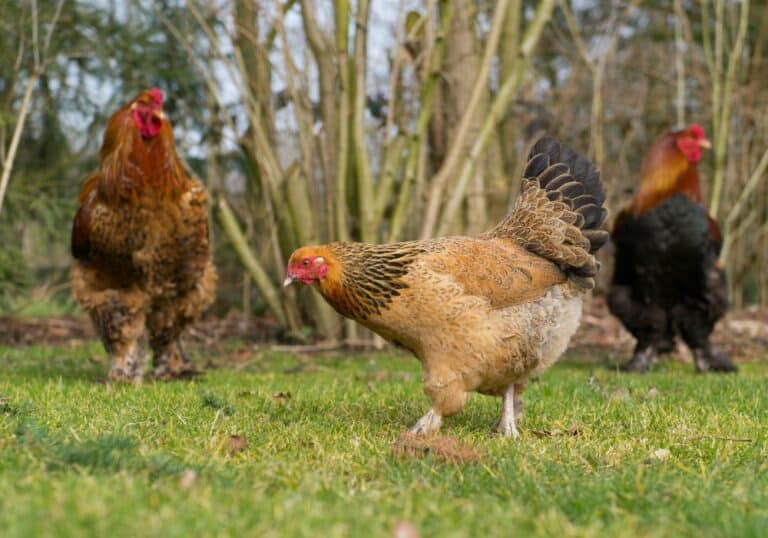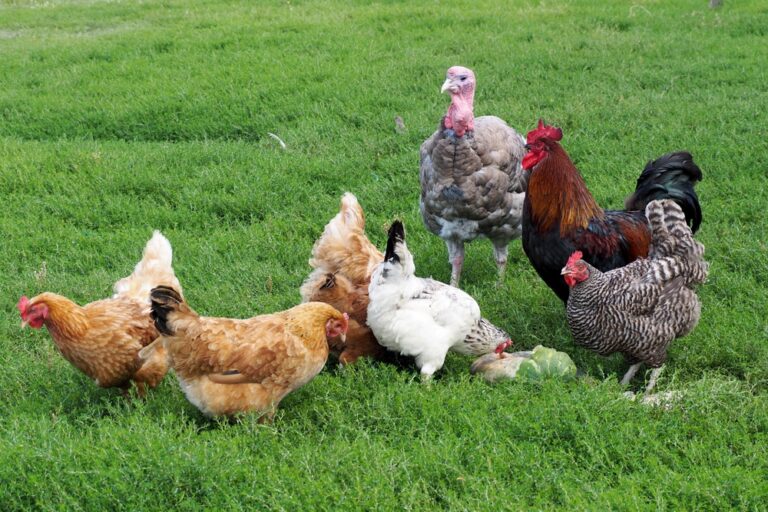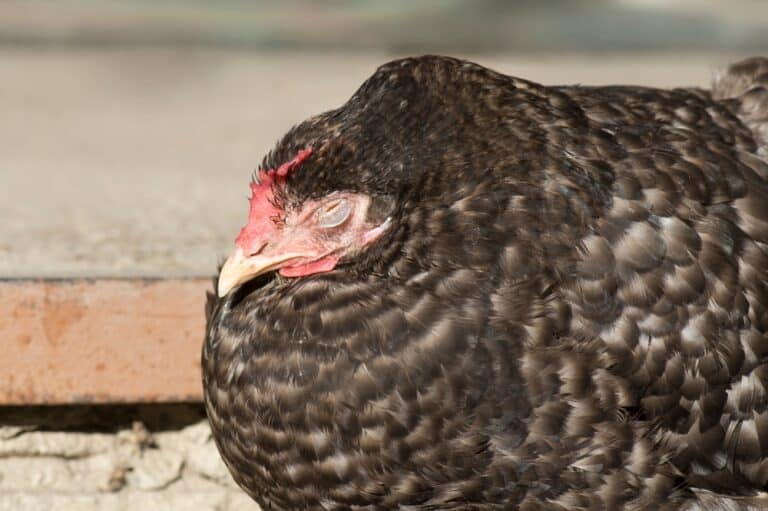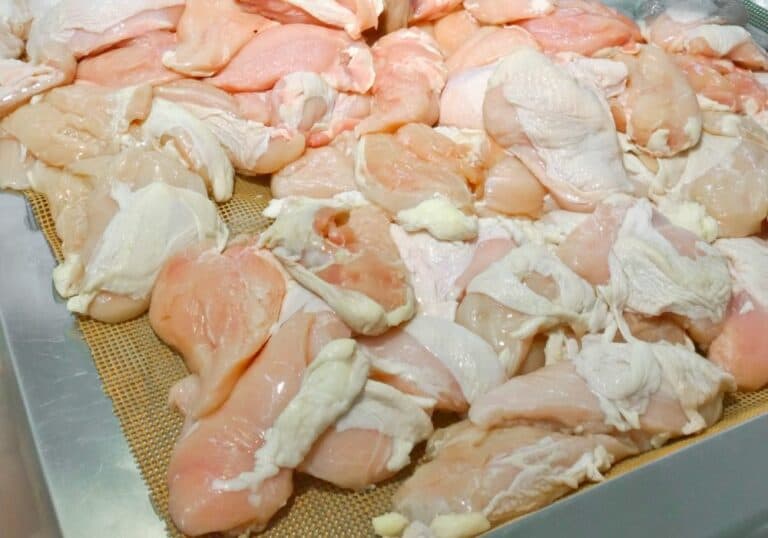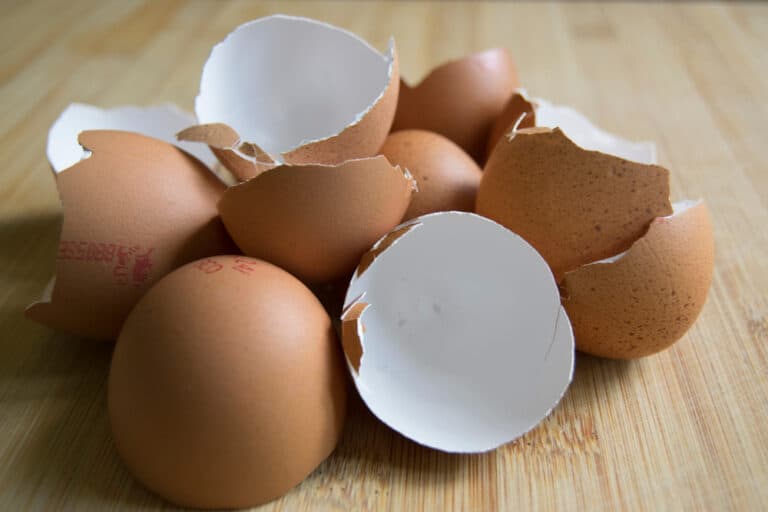One of the common questions that come up when talking about poultry food is: “Can chickens eat strawberries?” The answer is yes! Chickens can eat strawberries, one of their favorite treats to munch!
However, their delicious taste is not the only reason you should include strawberries in your chicken’s diet. Strawberries are rich in various nutrients, vitamins, and antioxidants, which are highly beneficial for your chicken’s health.
Now, let’s dive into the general information regarding strawberries, their nutritional profile, health benefits, and other interesting details!
General Information about Strawberries
Strawberries that we all love to eat are a hybrid species that belong to the Fragaria genus. Interestingly, strawberries come from the rose family or Rosacea family, similar to raspberries and blackberries but also roses.
If you are not familiar with these taxonomical terms and what is the difference between genus and family, click here. So, the Rosacea family is a family of flowering plants which produce many delicious, tasty, and edible fruits.
The most commonly encountered variety of strawberries in the US is the garden strawberries, although Camarosa strawberries are also popular. They are mainly cultivated for their big yields and amazing sweet flavor.
Generally speaking, strawberries are one of the most popular fruits globally. We use them for a number of different recipes and dishes, such as smoothies, fruit bowls, salads, and cakes.
Also, they are a very common food for many animals, not only chickens; those include chipmunks, slugs, bugs, and birds. And why wouldn’t they be? Strawberries have numerous health benefits and nutrients and are a good source of vitamins and minerals.
Which Parts of Strawberries Can Chicken Eat?
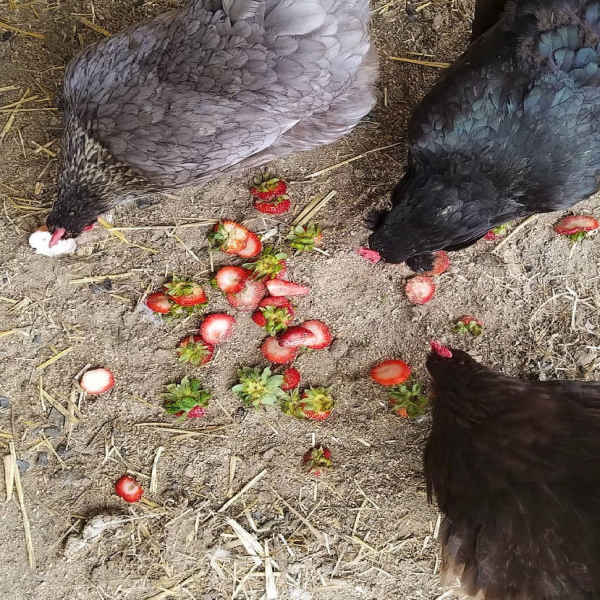
Although, when someone says “strawberry,” we immediately think about the fruit. However, strawberry has other parts, such as leaves, tops, and stems.
1. Leaves
The answer is complicated! If you go and search online, you will see that there is much conflicting information out there. Some say that leaves contain cyanide and will be fatal, while others claim that strawberry leaves can cause issues with digestion.
According to most sites, all parts of strawberries are allegedly non-toxic and safe to consume. However, people rarely use strawberry tops and stems to make recipes. When it comes to chickens, according to the Poultry DMV, strawberries are suitable for a chicken diet.
Chickens can eat leaves and tops, although it would not be a surprise if they are not amazed by their taste or avoid them. Obviously, the tastiest part of the strawberry is the fruit.
If you want to try strawberry tops and leaves, you can give them a limited amount to test their reaction.
Ultimately, some tend to avoid giving strawberry leaves to their flock because most farmers today use different pesticides sprayed on the entire plant, but most precisely, its leaves.
Interestingly, leaves have nutritional value and contain high amounts of vitamin C, so you will see strawberries as one of the fruits recommended for dealing with a cold. Furthermore, they contain antioxidants and have anti-microbial properties.
2. Stems
On the other hand, some people like to make herbal tea with strawberry tops! The same issue or debate goes for strawberry stems.
Many sources will claim that they contain deadly toxins released when they are picked, sending the toxin to the stem to repel bugs and other animals that might want to eat it.
On the other hand, some people have reported experiencing issues with digestion when consuming strawberry stems. Keep in mind that people are different, and some may be allergic to a component found in the strawberry stem.
Ultimately, the stems, tops, and leaves are safe to consume, according to the University of Maryland Medical Center. If you want to avoid all the fuss, you can stick to strawberry fruit and top.
Also, backyard chickens love to eat fruit, and if they can choose, you know what will be their choice.
What Are the Health Benefits of Strawberries?
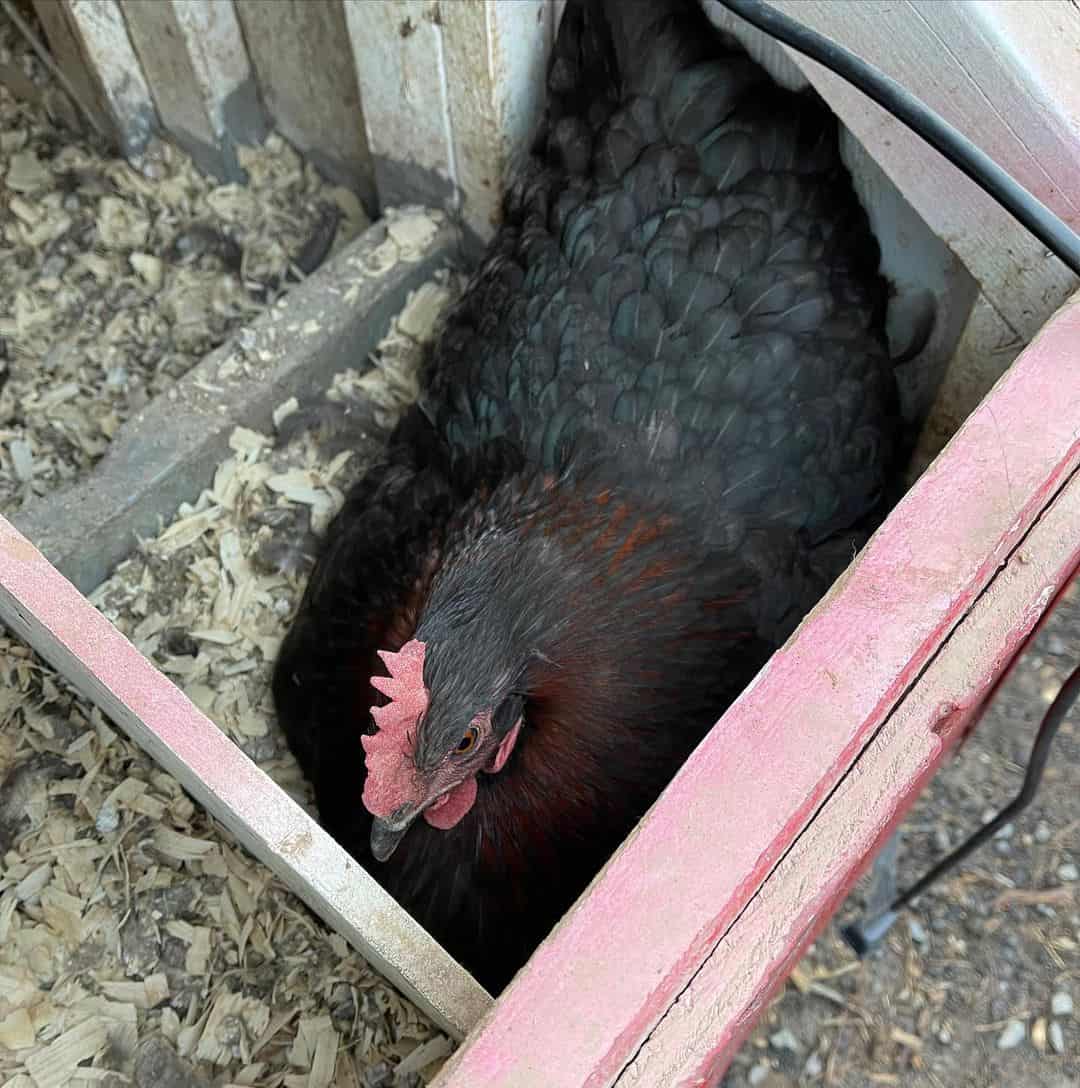
As mentioned, strawberries are among the healthiest fruits and have many benefits. Feeding an optimal amount of strawberries to your flock can positively impact their health, egg production, and, ultimately, their meat.
Did you know strawberries help sustain biological processes and are good for the entire body? Yes, that is true!
Like celery, strawberries are a low-glycemic food, making them ideal for those wanting to control their glucose levels. Strawberries are a great ally in fighting against heart diseases and generally promote heart health.
Heart failure or sudden chicken death syndrome are among the most common causes of backyard chicken death. Therefore, you ought to give them food that protects their heart health and helps them live a fuller life.
They also reduce inflammation and decrease oxidative stress. Besides heart health, they are known to improve vascular function and blood lipid profile. In addition, they are great for reducing harmful oxidation and cholesterol.
What is the Nutritional Profile of Strawberries?
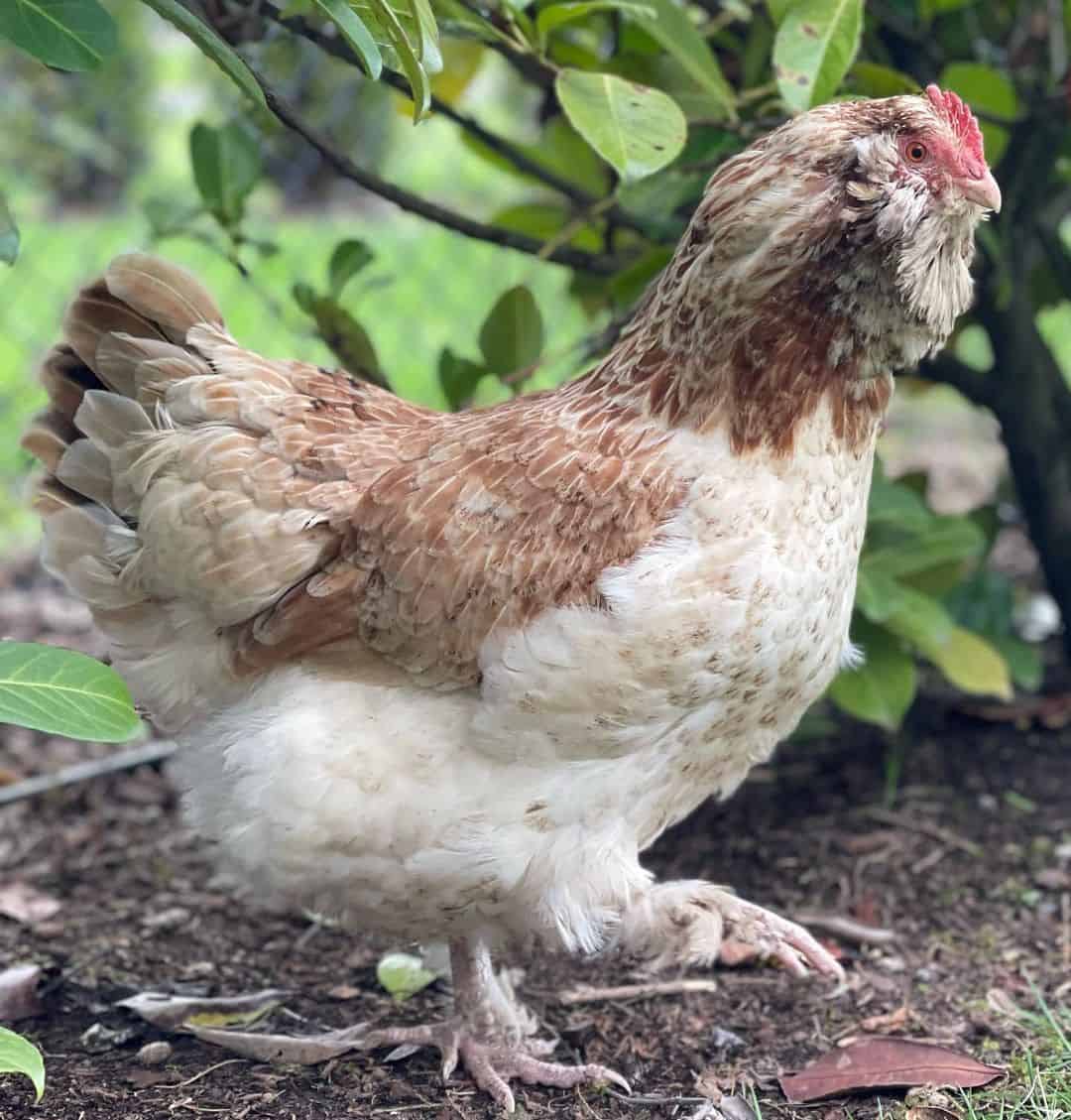
So, strawberries are mainly composed of water(91%); therefore, it offers hydrating properties to people and animals. Like most fruits, strawberries are packed with dietary fibers (2 grams), which are excellent for a chicken’s digestive system.
Strawberry is a low-calorie fruit with only 32 calories in 100 grams. On the other hand, strawberries are not quite rich in carbohydrates and contain around 7.7 grams. Regarding sugar levels, compared to other nutrients, it is moderately high, 4.9 grams.
As expected, strawberries are low in fat and contain only 0.3 grams. They also have a bit of protein, around 0.7 grams.
Furthermore, this delicious fruit has several crucial minerals, such as manganese, potassium, phosphorus, and magnesium. Potassium is known to facilitate key body processes and can regulate blood pressure.
Besides vitamin C, they also contain vitamin B9, which is vital for the immune system. As previously noted, strawberries are known for having many antioxidants and plant compounds, such as pelargonidin, ellagic acid, and ellagitannins.
These compounds are known to support and bolster immunity, prevent cardiovascular disease, and remove bad toxins from the body. If you want to learn more about these compounds, click here.
Avoid Giving These Foods to Chickens
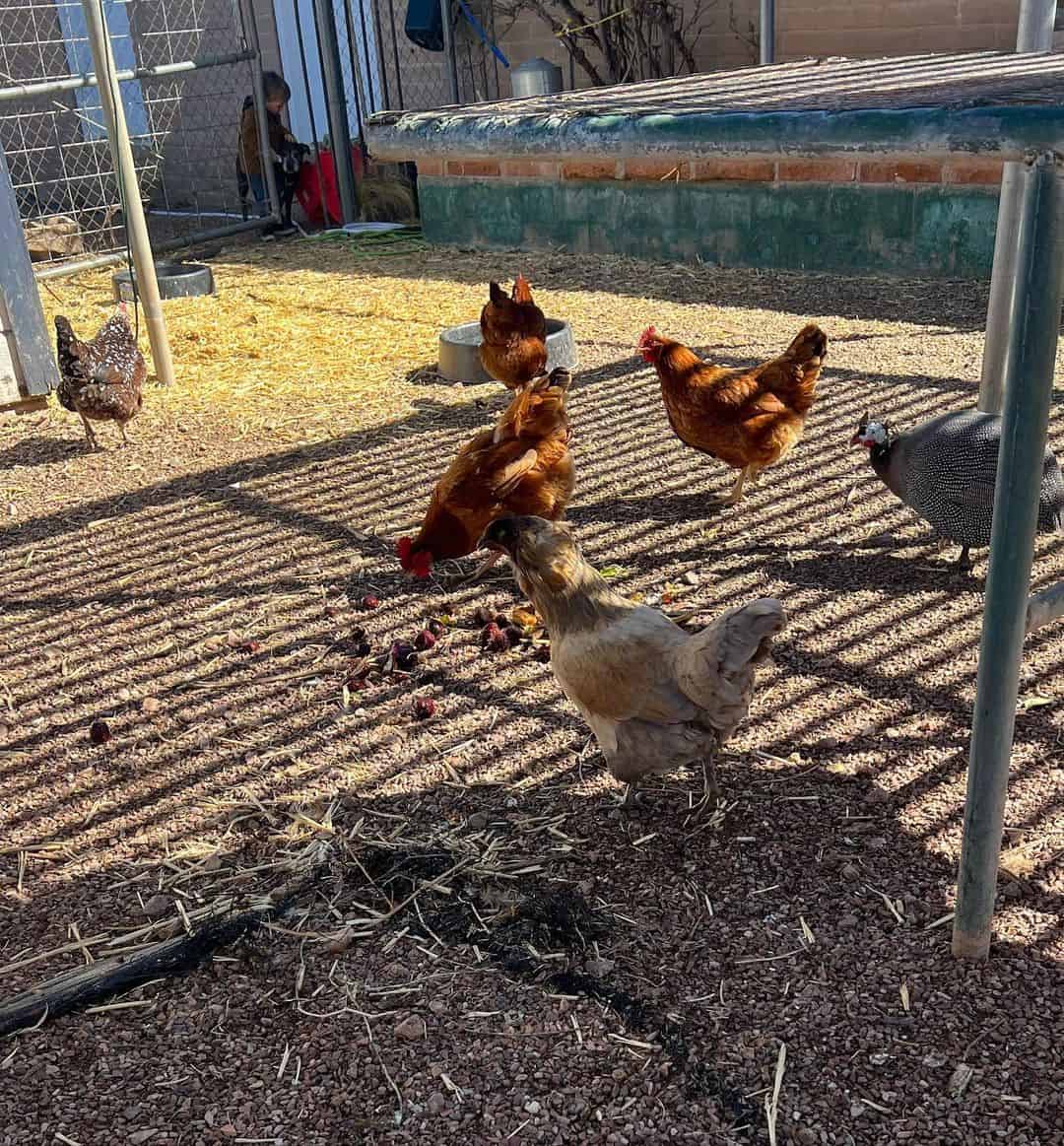
Do not give too much of anything to your chickens. Too much sugar is not good for your chickens and can cause them health problems, so giving them too many fruits can lead to this problem.
In addition, avoid giving jams, avocados, raw potatoes, rotten food, salty food, and food high in fats to chickens.
The same goes for avocado skins and potato peels. You can also add milk and dietary products to that list because chickens cannot digest lactose. Ultimately it is important that you skip vegetables that contain solanine, which can kill your chickens without a doubt.
Some of those veggies, such as raw potato peels, are already mentioned, but others include eggplants, peppers, and tomatoes.
What Do Chickens Like To Eat?

Strawberries are one of the chicken’s favorite fruits, and they also like to eat bananas, peaches, broccoli, corn, cooked beans, apples, and grapes, among others. Chicken’s like to eat most foods; also, they can have preferences like other animals and humans.
Considering that they are not known for their brains, they often tend to eat anything they find on the ground, including inedible things such as rubber, wood, and plastic, so be careful if your chickens are free-range. The best diet for chickens is a well-balanced one.
So, in addition to commercial feed (which should be high-quality), you can include vegetables and fruits like those mentioned above in their diet and smaller quantities. Chickens also like cooked rice, pasta, grits, and oatmeal.
When it comes to strawberries, we suggest that you use a bit of riper strawberries, especially if you are feeding chicks. Some strawberries can be hard and firm, so your chicks might struggle to eat them. You can cut them into small pieces
FAQs
1. Do Strawberries Contain Cyanide?
If you read somewhere that strawberries contain hydrogen cyanide, that is not quite correct. Unfortunately, many websites write about this deadly chemical as a component of strawberries and suggest that you should not eat too many strawberries.
As noted, moderation is the best rule with any food, including strawberries. However, strawberries do not contain any type of cyanide, and if they did, we would not be consuming them.
The source of confusion is that strawberry leaves release hydrogen cyanide in the early stages of decomposition, similar to their other ‘cousins’ in the Rosacea family.
Therefore, avoid giving old, moldy, or decomposing strawberries, including their stems and leaves. But on the other hand, almost every food that is rotten, stale, or moldy will cause your chicken’s health problems.
2. What If I Give Too Many Strawberries or Too Often?
However, when it comes to chickens, the issue is a bit different. The strawberries have a high sugar content for chickens, and if they eat it very often, that might cause them heart issues, which is partly ironic.
Strawberries contain a compound called anthocyanins, which has been proven to improve heart health. Several studies have linked this compound with lowering the risk of a heart attack or other heart problems.

